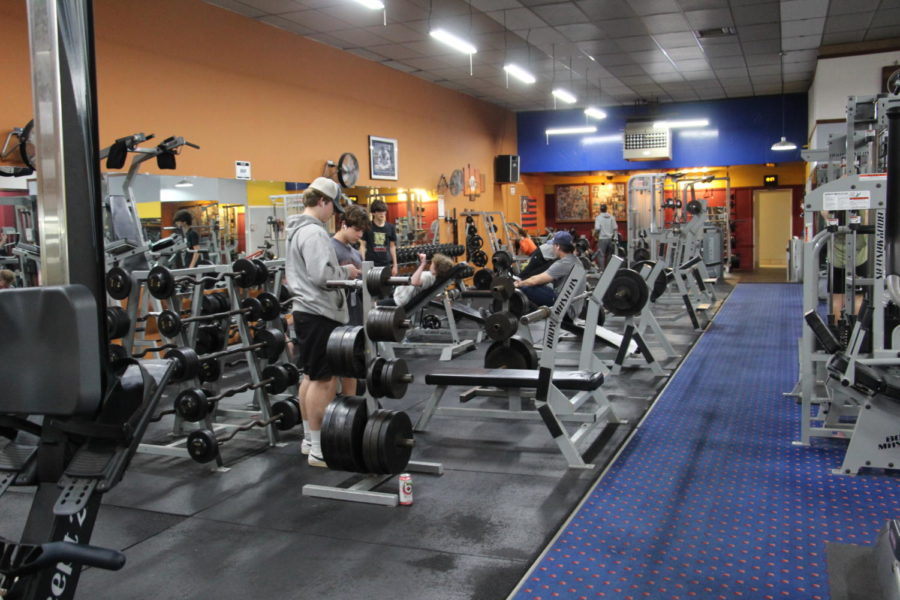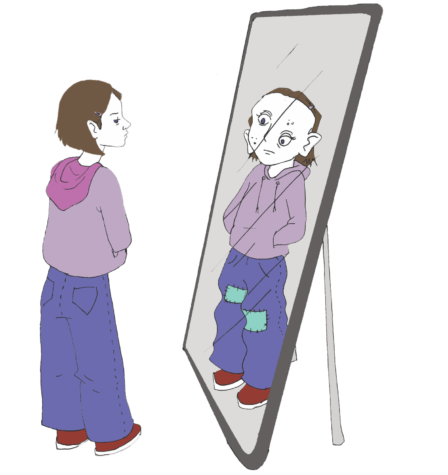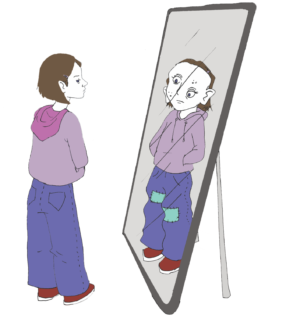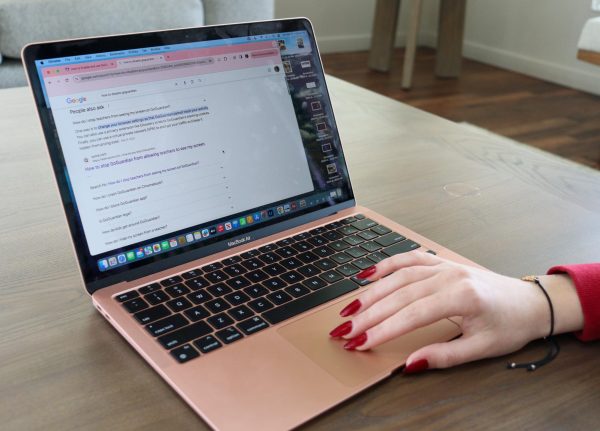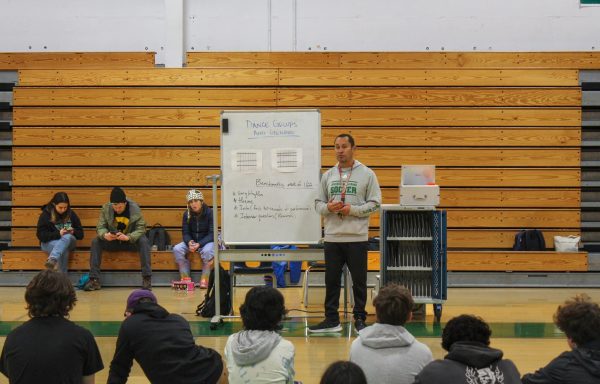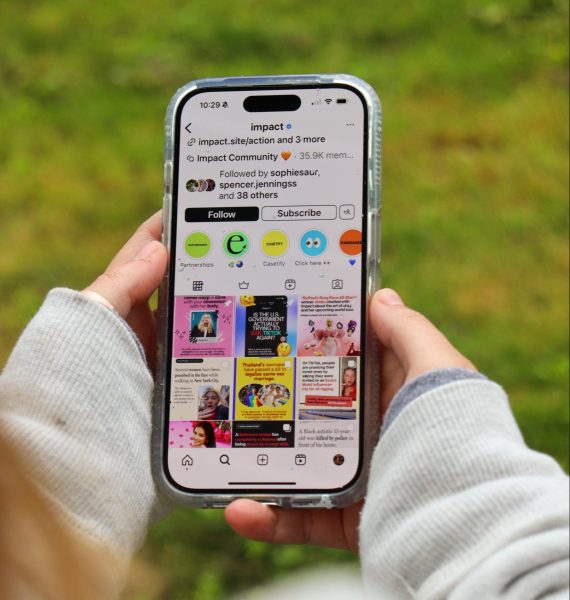Gym Envy
Archie Williams students work out at the Fairfax gym.
How envy affects the mindsets of gym goers
The gym is a place known for a type of culture that revolves around body image, and is often stereotyped as being associated with envious behaviors and mindsets. Gym goers may be experiencing these feelings due to unrealistic expectations exemplified by the fitness industry. It’s human nature to have feelings of envy when observing someone who has attributes that are superior to yours, especially when in and around gym culture.
Envy is an emotion that can be depressive and emotionally draining, and is linked to self-deception and body image issues. Envious feelings are best described as feelings of jealousy, spitefulness, and resentfulness, and longing for someone else’s possessions. These feelings often surface through insecurities involved with self image.
Many gym goers compare themselves to others for a number of reasons, some of which are size, strength, and muscle definition. Donavan Traub, Archie Williams sophomore, believes that feeling envy plays a large role in comparing yourself to others negatively, but also can create determination.
“A lot of people get jealous of others, and people compare themselves way too much [to other people]. I think a mature person should see [being jealous] as a motivation to work harder, but people get upset about [other people having a better physique],” said Donovan.
Donovan believes that at the root of feeling envious is a desire for self-comparison. With negative body image being so heavily associated with gym culture, Donovan believes gym users should be trying to pursue other mindsets that create more positive outcomes for their mental health.
“It should be more about admiration than comparison. [People should be thinking], ‘that’s really great for them,’ not ‘why are they bigger than me,’” said Donovan. “I’ve had people [be envious towards me] many times for being bigger than them, I think its just really stupid.”
With gym culture being deeply associated with the fitness industry, Jesse Alonso, gym employee at the Fairfax Health Club, believes that unhealthy body comparisons can cause people to make dangerous decisions, like using steroids.
“When someone sees a physique online and realizes it’s out of reach, they look past all the potential bad sides to steroids and they do it for the sole purpose of chasing somebody else’s physique,” said Alonso.
Influencers on social media in the fitness industry can cause people to have feelings of envy. A person who compares themselves to someone who is considered to be “better than them” physically, by their own standards, can experience mental health issues associated with body image. Donovan explains how he thinks such comparison on social media ties into negative body image and how envy may be a motivation for some.
“I think if you envy someone, it can, in some cases, be positive [for motivational reasons], but comparing yourself [to others] can lead to a lot of issues [that relate to mental health] and it can be really unhealthy and bad for you,” said Donovan.
Donovan thinks when someone compares their body to someone else’s it can cause physical insecurities, especially when faced with someone who is considered to have “one in a million” genetics.
“I think people become more insecure because they are constantly bombarded with what they see on social media [platforms], like on TikTok or whatever. [They are] seeing the extreme 0.0001% of people [who are in amazing shape], absolute genetic freaks, that are more often than not on steroids. With that being all they see, they don’t think about the millions of other people that are average,” Donovan said.
With a large part of gym culture revolving around teen boys and young men, teens and young women looking to get into the gym can often feel intimidated. And a gym packed with young men trying to prove to themselves is not always the most welcoming space for teenage girls.
Emily Switzer is the owner of strength and wellness center, The Anchor Method Marin, a studio specifically for girls ages twelve to nineteen. Switzer runs hour-long group classes and one on one sessions in her studio. Her classes consist of 45 minutes of strength and conditioning, and a closing 15 minute stretching and reflection period.
“I wanted to create a space where [women and girls] feel comfortable, safe, and empowered to get a good workout in and make sure that they understand what muscles they’re working, how to move properly, and how to feel really good,” said Switzer. “The girls are really catching on to having a space where they feel strong and powerful and confident, as the gym typically isn’t a space where they have felt comfortable.”
Part of Switzer’s motivation for opening her studio also comes from her experience as a kid when she first started to work out.
“The girls who have started are really really seeing progress and seeing their strength and really owning their bodies. Whereas, for myself when I was their age I can’t relate to [that]. I didn’t like the way I looked and I didn’t like the way I felt, so working out and moving my body and kind of taking control of my body gave me power and gave me strength,” Switzer said.
As it is human nature to compare yourself to others, naturally, envy of others’ physiques is also a problem for girls and women in the gym.
“I’ve heard a lot of the girls talk about TikTok or Instagram and how they used to do a lot of the workout videos, especially during [the pandemic],” said Switzer. “A lot of the information is really false, and a lot of girls follow really bad information that isn’t good for their bodies or their mental health.”
While these issues are prominent for many teen gym goers, male and female, there are also plenty who are successful in focusing on themselves and their own goals.
Archie Williams sophomore Caroline Lozaw says that her main reasons for working out are for her sport, and to feel better and stronger. She says that she tries not to pay attention to gym culture on social media and works out for her personal gain.
“I don’t post my gym progress. I like my gym stuff just staying in the gym or private to me and seeing the progress myself,” Caroline said.
Like many teenage girls, Caroline says that at first, she was hesitant to join the gym.
“I’d been wanting to go to the gym for a while, but I was kind of scared because it seemed like an all boys gym and not a lot of girls,” Caroline said.
However, she says her experience in the gym has been mostly positive.
“I’ve never really felt uncomfortable. The culture there is pretty much all the people from our school and it has been very welcoming,” said Caroline. “I would encourage anyone who wants to go to the gym to go to the gym, because I was part of the stereotype that I thought I would be judged at the gym. But everyone’s there for the same reason as you and nobody’s judging.”
Archie Williams junior Lucas Winter says that he also experiences positivity and a sense of welcoming in the gym. Lucas says he often goes to the gym with friends, and they help each other with motivation and support, rather than trying to be better than one another.
“I would say that the gym is less of a competitive space and more of an uplifting space, and everyone’s in there for personal self improvement. I would definitely say that my friends and I have helped each other a lot with pushing each other, pushing each other to our limits and helping each other get better every day,” Lucas said.
It is fair to say that whether it be a public gym, or a private studio, everyone should be able to find an environment where they feel comfortable and confident while working out.
“Yes, it’s really intimidating, intimidating and scary. But at the end of the day, it is a community we’re all here at the gym to try to feel better. It’s not a competition. It’s you versus you, not you versus other people,” Switzer said.
Your donation will support the student journalists of Archie Williams High School. Your contribution will allow us to purchase equipment and cover our annual website hosting costs. Each donation will receive a magazine subscription for a year (6 copies a year), and become a part of the important work our publication is doing.
$35 -- Subscription to the magazine
$50 -- Silver Sponsorship
$75 -- Gold Sponsorship
$100 -- Platinum Sponsorship

Henry is a junior and in his second year of journalism. He is proud to be on two different swim teams for 10 years, Sleepy Hollow and North Bay Aquatics....

Jack is a sophomore who is in his first year of journalism. He spends time with his friends and enjoys baseball in his free time. His favorite subject...

Willy is a junior and is in his second year of journalism. He is fluent in French (Bonjour!) and really enjoys photography. He goes to the gym all the...


